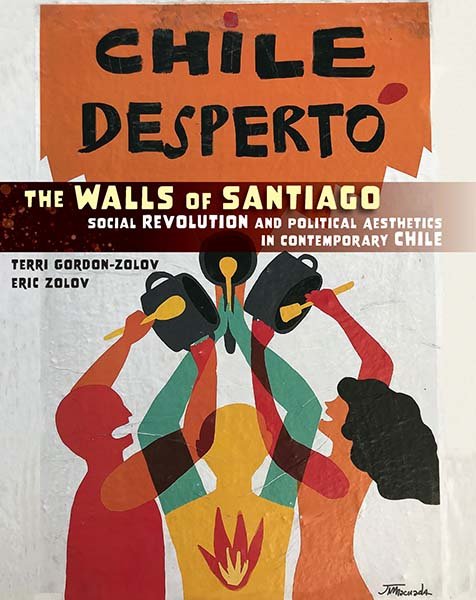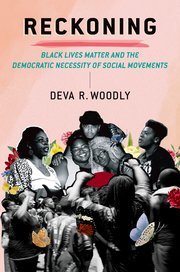Great 2022 Nonfiction From the New School Community
Music+Revolution: Greenwich Village in the 1960s, by Richard Barone (Faculty, School of Jazz and Contemporary Music); Backbeat Books, Rowman & Littlefield.
The Bitter End. Gerde’s Folk City. The Gaslight Café. At these legendary coffee houses, artists including Odetta, Joni Mitchell, Buffy Saint-Marie, and, yes, Bob Dylan came to the attention of audiences, critics, and record labels, adding political, and deeply personal, songs to the traditional folk music repertoire. Barone, himself an accomplished musician, tells a story one reviewer promises “will teach you so much about a time and place that really did change the world.”
Studies Into Darkness: The Perils and Promise of Freedom of Speech, curated by Carin Kuoni (Director, Vera List Center for Art and Politics), Amherst College Press.
Hate speech. Censorship. Control of and access to social media platforms. Could there be a more provocative and timely set of subjects? Kuoni assembles newly commissioned texts, art projects, and other resources, providing a guide to the history and contemporary reality of free speech discourse – an idea central to American life, and one that has rarely been under more intense scrutiny.
The Walls of Santiago: Social Revolution and Political Aesthetics in Contemporary Chile, by Terri-Gordon Zolov (Associate Professor, Contemporary Literature Studies) and Eric Zolov; Berghan Books.
For six months in 2019-20, what began as a spontaneous protest about subway fare increases in the capital city of Santiago led to massive nationwide protests against the Chilean government. Vivid graphic art – including posters, murals, and graffiti – played a dramatic role in a movement that changed the direction of Chilean politics. The book includes more than 150 of the authors’ photos taken during protests that epitomized a new global era of political engagement.
Mike Tyson, photos by Lori Grinker (Professor of Journalism); powerHouse Books.
On an art school assignment in the early 1980s, Grinker asked legendary trainer Cus D’Amato about up-and-coming boxers. He pointed to a 13-year-old working a speed bag, saying he’d one day be world heavyweight champion. So began a decade-long inside photo chronicle of Tyson’s rapid rise to fame, that shows him in his marriage and divorce with Robin Givens, at home on the streets of Brownsville, and in training and in boxing rings around the world.
Hysterical: A Memoir, by Elissa Bassist (MFA, Creative Nonfiction, 2012); Hachette Book Group.
For two years, Bassist – editor of the “Funny Women” column on The Rumpus – saw more than a score of medical professionals about a variety of mysterious, seemingly incurable ailments, until an acupuncturist correctly diagnosed her pain as resulting from caged fury. A memoir of a voice lost and found that New York Times columnist Roxanne Gay found “staggeringly good…one of the most intelligent, painful, ridiculous, awesome, relevant things I’ve ever read.”
And don’t forget some recent books we’ve previously highlighted:
And the Category Is…: Inside New York’s Vogue, House, and Ballroom Community, by Ricky Tucker (lecturer, Eugene Lang School of Liberal Arts); Beacon Press.
A valentine to the legendary Black and Latinx LGBTQ underground subculture, uncovering its rich legacy and influence in popular culture. One reviewer describes it as “a treasure trove of insider perspective – deeply respectful, full of critique and celebration, oral history and personal narrative. A little bit academic, a lot of wisdom, and glamour, yes, of course, and context…a crucial piece of queer history and contemporary queer culture.”
Women’s Liberation! Feminist Writings that Inspired a Revolution & Still Can, edited by Alix Kates Shulman and Honor Moore (nonfiction coordinator of the New School’s MFA in creative writing program); Library of America.
Shulman and Moore have collected an unprecedented half-century of works – many now hard to find or long out-of-print – telling the story of modern American feminism, from The Feminine Mystique to the #MeToo movement. Childcare and housework; gender, class, and race; birth control and abortion; domestic violence; feminist art and literature: Shulman and Moore introduce 50 years of personal and political writings on these and other topics – writings that transformed American life.
Elaine Black Yoneda: Jewish Immigration, Labor Activism, and Japanese American Exclusion and Incarceration by Rachel Schreiber, PhD, (Executive Dean, Parsons School of Design); Temple University Press.
During World War II, Yoneda, a daughter of Russian Jewish immigrants, spent eight months in a concentration camp – not in Europe, but in California, accompanying her husband to the Manzanar Relocation Center, even as they publicly supported the US’s decision to inter the West Coast’s Japanese Americans. Schreiber recounts Yoneda’s lifelong activism, including efforts to designate Manzanar a Federally recognized memorial site and to secure reparations for those detained there.
Reckoning: Black Lives Matter and the Democratic Necessity of Social Movements, by Deva R. Woodly, (associate professor of politics and director of undergraduate studies at the New School for Social Research); Oxford University Press.
“As far as we can tell,” Woodly writes in this book’s lyrical introduction, “my roots in this country go back at least seven generations on both sides. Those generations toiled to build and serve this nation while being brutalized, stolen from, disrespected, and disavowed…They are owed, for both their unpaid labor and their faith that this American idea could one day justly serve the entire polity. What that means to me is that this nation is mine. Mine to claim. Mine to hold to account. Mine to participate in reshaping.”
Red Sauce: How Italian Food Became American, by Ian MacAllen (frequent New School creative writing guest speaker); Rowman & Littlefield.
Evoking memories of savory aromas coming from nonna’s kitchen and of now-rapidly vanishing neighborhood red-checkered tablecloth restaurants, MacAllen’s debut book combines well-researched immigrant history, social insights, and scores of recipes. Red Sauce is an eminently readable endeavor, in the words of a Brooklyn Rail reviewer, “to save the original version before it becomes a mere nostalgic memory of the past, like a black and white photo album of our great-grandparents’ marriage.”
Next week: Our fiction picks.
Bruce Cory is editorial advisor at The Center for New York City Affairs at The New School.











